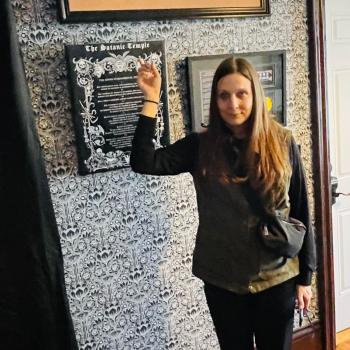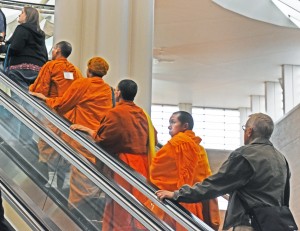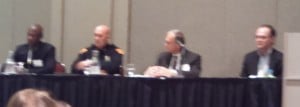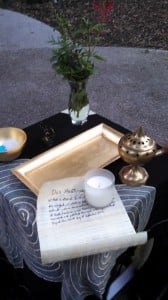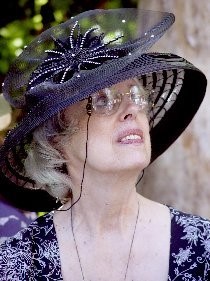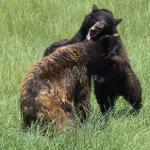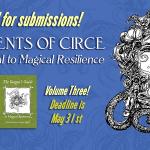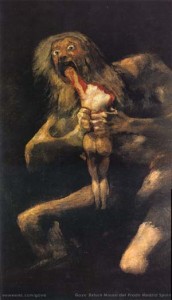 Blood feud. Bloodlust. Blood revenge. My friend Emad says that Americans will never understand conflict in the Middle East without grasping this basic concept. As I left the Parliament of the World’s Religions the shuttle driver and I chatted about how his Christian family fled to America from religious persecution in Iraq. Even though we had just spoken with approval of the calls for peace at the Parliament, the driver added, “But if someone were to kill my brother, then I have the right to go and kill one of his family, and I would do it, and then they would have the right to kill one of us.” My husband and I glanced at each other in the back seat and silently shuddered.
Blood feud. Bloodlust. Blood revenge. My friend Emad says that Americans will never understand conflict in the Middle East without grasping this basic concept. As I left the Parliament of the World’s Religions the shuttle driver and I chatted about how his Christian family fled to America from religious persecution in Iraq. Even though we had just spoken with approval of the calls for peace at the Parliament, the driver added, “But if someone were to kill my brother, then I have the right to go and kill one of his family, and I would do it, and then they would have the right to kill one of us.” My husband and I glanced at each other in the back seat and silently shuddered.
Today I am reflecting on the night’s horrors in Paris, as well as the hateful words I saw posted online by Pagans this week. Once more, I am aghast at how Cronus devours his own children, how we are so quick to seek blood revenge, quick, even, to be first to draw the knife, usually without even having full information. Tomorrow I will be part of the annual meeting of the state interfaith organization on whose board of directors I serve. There we know that to carelessly attack each other, even when we are convinced we are on the correct side, is to earn us an escort to the proverbial door lest we lose the tender coalition we have built. Several hundred Pagans attended the Parliament with me, but I wonder if we really learned the first lessons about interfaith? Here is an excerpt from a handout that we often use in my group:
- Allow others to express their beliefs and practices in the terms that they choose, not attempting to reframe their beliefs in a way that makes us more comfortable.
- When we hear any religion disparaged or misrepresented, not just our own, we speak up for the rights of members of that religion to believe and practice in freedom.
- Accept that at times people disagree. This does not imply a personal slight, or even conflict.
- Practice the art of inclusive language. For example, when discussing spiritual matters, we often frame our statements with phrases such as, “in my tradition,” or “as I understand it,” or “in my opinion,” as a way of indicating that we do not claim to speak for others when expressing beliefs or feelings.
In my own Egyptian tradition we have the “Wisdom of Ptah-Hotep,” in which the author speaks on the topic of “Refusing to Listen to Rumours. Do not repeat slanderous rumours, don’t even listen to them. Such rumours are the common language of over-excited, belligerent people. If you must, give evidence about something you witnessed, not something you just heard about.” (trans. Jacq, 2004)
If we are truly interconnected, as we Pagans claim to be, we must nurture those fragile connections, even the ones we do not understand. Thom van Dooren had good advice in his 2005 essay in Pagan Visions For A Sustainable Future (2005): “. . . [B]y consciously acknowledging others through the making of relationship with them, we naturally enter into an awareness of their, and our, being in a sacred community. We become psychologically transformed; we begin to find our inter-connectedness with others.” Those relationships are constantly challenging me, causing me to step across the room and view the world from another angle. Sometimes I don’t like what I see; always I am enlightened and enlarged.
When tempted to excise from my life that which I find distasteful, I try to remember that if we are connected, this thing is actually a part of me which I’ve not yet come to understand. Part of seminary work is to learn to turn the camera lens back and forth from a fine focus to pulling away for a wider view. We lean deeply into that which we find ineffable, and we also discover tools which allow us to step back and be more effective.
As the darkest season closes in on us, may we all lean into our own darkness, discover new perspective, and use that wisdom to bring peace to a war-torn world.



